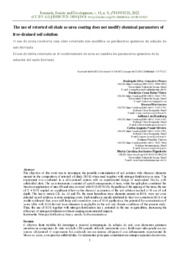The use of retorted oil shale as urea coating does not modify chemical parameters of free-drained soil solution.
The use of retorted oil shale as urea coating does not modify chemical parameters of free-drained soil solution.
Author(s): NUNES, R. S. G.; VIEIRA, F. C. B.; MARTINAZZO, R.; BAMBERG, A. L.; SILVEIRA, C. A. P.; TORRES, D. P.; FIGUEIREDO, M. C. dos S.
Summary: The objective of this work was to investigate the possible contamination of soil solution with chemical elements present in the composition of retorted oil shale (ROS) when used together with nitrogen fertilization as urea. The experiment was conducted in a silvopastoral system with an experimental design of randomized blocks, with subdivided plots. The main treatments consisted of spatial arrangements of trees, while the split plots constituted the broadcast application of urea (U) and urea covered with ROS (U+ROS). Regardless of the spacing of the trees, the use of U + ROS implied no significant effect on the chemical parameters of the soil solution leached at 40 cm of soil depth. The heavy metals Cd, As, Al and Pb, the most hazardous trace elements present in ROS, were not even detected in soil solution, in none sampling event. Such results are mainly attributed to their low contents in ROS. Our results evidenced that, even with large and cumulative rates of ROS application, the potential for contamination of water table with ROS-derived trace elements is negligible in the soil and climate conditions of the present study. Thus, the use of ROS together with nitrogen fertilization has a potential in the use in agriculture, increasing the efficiency of nitrogen fertilization without causing environmental impacts.
Publication year: 2022
Types of publication: Journal article
Keywords: Fertilizante, Fertilizante Nitrogenado
Observation
Some of Embrapa's publications are published as ePub files. To read them, use or download one of the following free software options to your computer or mobile device. Android: Google Play Books; IOS: iBooks; Windows and Linux: Calibre.
Access other publications
Access the Agricultural Research Database (BDPA) to consult Embrapa's full library collection and records.
Visit Embrapa Bookstore to purchase books and other publications sold by Embrapa.

